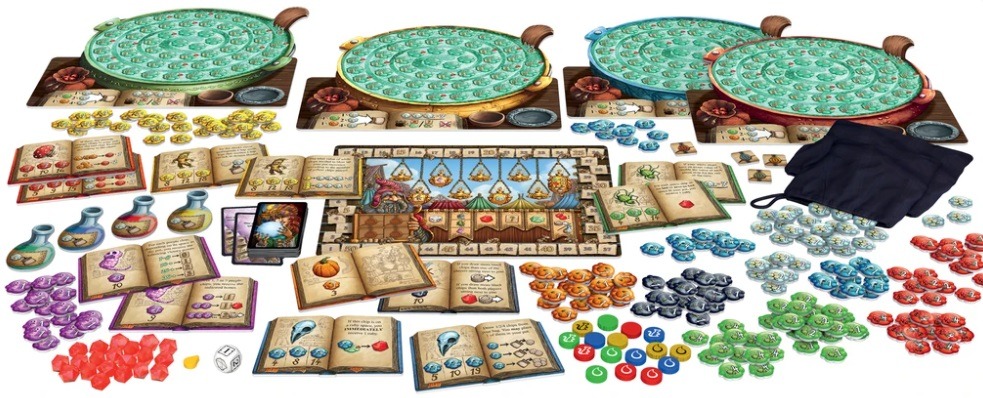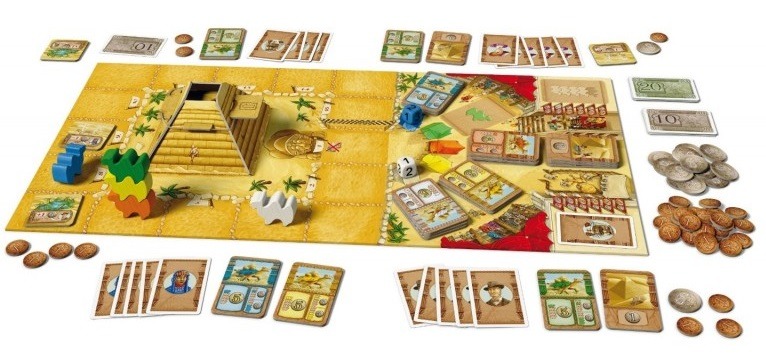Today we’re taking a look at a bit of game theory. A random factor is a strong building block in modern board games, with games relying on it more, or less. Let’s see the theoretical distinction of different types of board games according to the amount of skill and luck involved.
Introduction to Different Types of board games
Imagine that you have a pile of board games, which you want to sort by skill needed to play and the random factor the gameplay involves.
On one side, we have board games where there is no skill involved, only luck (chance); and on the other side, we have board games that are pure skill-based.
In the middle of these two extreme cases, there is a third type of board game: this one contains the majority of board games and involves both skill and luck – but in various quantities and ratios.

1. Pure Luck Board Games
Let’s say your friend is tossing a coin and let’s say it’s a fair coin – the toss can only have two outcomes (head or tails) and the probabilities are 50/50. This is a pure luck game. It does not matter what the last toss was, or what the last 10 or 100 tosses were. It doesn’t matter what your friend’s mood or the weather is. In fact, it doesn’t even matter what you say. Head, tails, a hundred times head, a hundred times tails – the probability of you guessing the next toss is always 50%.
This is a board game where skill does not matter, it all comes down to luck – your choices in this game do not matter.
2. Pure Skill Board Games
Let’s first define what I mean by skill in board games. It is a combination of complex but sensible game mechanics in which a good player can develop different strategies and approaches to outwit other players.
This type of board game is slightly harder to find – the best examples are two classic board games, chess and go. In chess, there is an absolute minimum of luck involved (white gets a minor edge), but matches are usually several games long, so that every player gets both white and blacks equally and eventually only skill matters.
I’ll give you another example. Assuming you are a quite decent chess player. I’ll give you even more credit – say you are an above-average player: you’re beating your friends regularly, you’ve read some books, studied some openings and closures, all the good stuff.
Now I’ll put a chess master against you. A real expert, someone like Gari Kasparov. You are going to lose. A lot, very likely every single time with both whites and blacks. He just has more skill and you can’t count on getting lucky since there is no luck involved.
We can say that the outcome of this board game depends solely on player skill – the better player always wins.
Take a look at Best Abstract board games – games with very little luck involved
3. Board Games with both Skill and Luck involved
Most board games fall under this category and it’s not hard to see why. Both previous categories have major drawbacks that disinterest the long-term engagement of an average player: your choices do not matter; the better player always wins.
- Your choices do not matter.
In this type of board game, there is a problem with player involvement. As there is very little a player can do, they will lose interest very soon. (One way to keep the player coming back is introducing betting and giving him different odds (think roulette or craps), but this is beyond the scope of this article.)
There is no complexity of game mechanics, different strategies cannot evolve, a debate cannot spur, and the game cannot develop a community or a cult of followers.
- The better player always wins.
Although the above is still true, it’s a bit different here – player skill can change over time. With a lot of skill involved in this board game, the players have an opportunity to learn, adapt and develop different strategies. Most popular board games (namely chess) of this type have a huge following and dedicated communities (tens or hundreds of years old!) with a ton of studies, books, and articles produced.
Therefore, even if the better player still wins, the lesser player has all the chance (and motivation) in the world to get better and get him next time. But it would still be hard to beat Gari Kasparov. 🙂
An Example: A great example of a game that requires a bit of luck and skill would be the popular online board/grid game, Minesweeper. Minesweeper is a game won by a combination of luck and skill as players must strategically deduce mine locations while relying on luck to uncover safe tiles.
The best of both worlds
We’ll have a look at another example here: a board game with mediocre skill and mediocre luck factor involved – let’s pick a simple mainstream board game, such as Camel Up. It has just enough skill involved to keep players engaged and to think about their actions (they must consider the odds when betting) and just enough luck that it keeps the excitement high.

You never know what is going to happen: how the dice will roll, which camel will move where, and eventually, who will win. Yes, the most skillful player will win most of the time, but it’s that factor of luck, that allows your little nephew a bit of hope that maybe next time the camel he bets on will be the lucky one.
Most board games try to hit that sweet spot and it’s the holy grail of board game design. You want your board game to require plenty of skill and complexity so that advanced players can develop different strategies for it.
But still, the game must be easy to understand and picked up by beginners, so that the game is interesting to a wider audience, making the game popular. This makes sense economically and also as a personal achievement of the designer.
You want a certain amount of luck to keep the game fresh and interesting for all players, to keep them coming back for excitement. But then again, not that much that it prevails over skill and creates too many chaotic moments (have high variance) – that too will drive players away.
As a rule of thumb high skill level and a mediocre level of luck is what the best board games are made of. It is indeed a thin line. Here are a few examples of board games that nailed it:
Conclusion
I hope this article, although slightly more theory-heavy, was an interesting read and you learned something about different types of board games when it comes to skill and luck involved in them, why board games try to hit that sweet spot, and also why it’s not an easy task for the designers.
If you have any questions, please leave them below and I’ll be glad to answer them.
Vasilij

I’ve been a backgammon enthusiast for many years. I think that backgammon hits that “Sweet spot” where there’s a great deal of skill involved but just enough luck to keep it interesting. That “luck factor” can cause the game to turn one way or the other in just one roll of the dice. I’ve played games where the advantage has gone back and forth several time.
But over time the skillful player wins the majority of the time. To those people who think backgammon is “all luck” I’d like to play you for a LOT of money LOL!
Backgammon is in this sense a lot like like poker. It can (and is) also be played for money, but is unfortunately nowhere near as popular, especially in our country. I’d love to find the time (and motivation) to play it more, though. (Another such game that is on my to-do list for ages is Go.)
Are you familiar with Meeples? My daughter and son-in-law introduced me to them. They have even made “Meeple” shaped soaps and sell them in a game store/shop in central Georgia. How much are Meeples used? Are they mostly for games that are customized or home-made?
As far as I know, the term refers to people shaped (usually wooden) figures used in various board games and it originates from Carcassonne.
Hi there, I really loved this post. You really hit the nail on the head with your description on the types of board games. I’ve been playing card games recently with my young cousins and was finding that I much prefer to play certain games compared to others but never paused to dig a little deeper to figure out why. However, this post has answered the question for me. Thanks so much. I look forward to reading more of your posts.
I’m happy to hear my post has been helpful (and that you actually read it :D).